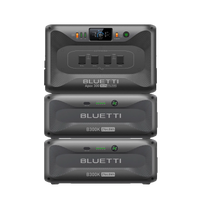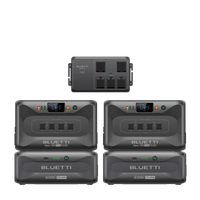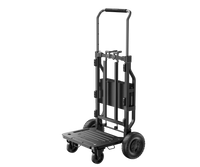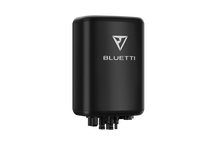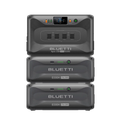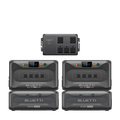Your cart is empty
Shop our productsSolar panels are becoming increasingly popular when it comes to harnessing clean and renewable energy.
They offer a sustainable and cost-effective solution to meet electricity needs.
With solar panels, there are distinct differences between residential and commercial installations.
Understanding these differences is essential for homeowners and businesses considering solar energy.
Let's explore the variations in scale, power output, installation, financing, and regulations between residential and commercial solar panels.
What Are Residential Solar Panels?
:max_bytes(150000):strip_icc()/house-with-solar-panels-181062267-7f895543fc8646e8b0807804f2054b32.jpg)
Residential solar panels are devices that capture sunlight and transform it into useable electricity for your home.
They are usually installed on rooftops or other sunny areas.
These panels are made up of small solar cells that can generate an electric current when sunlight hits them.
How Do They Work?
- Step 1 - Sunlight is absorbed
- Step 2 - Generating electricty
- Step 3 - Converting to useable electricity
- Step 4 - Powering your home
- Step 5 - Net metering
- Step 6 - Monitoring your system
- Sunlight is absorbed: When the panels are exposed to sunlight, they soak up the energy from the sun. The panels are strategically placed to receive as much sunlight as possible throughout the day.
- Generating electricity: Inside the panels, there are special materials called semiconductors, typically made of silicon. When sunlight shines on these materials, it excites the electrons inside them. This excitement creates an electric current, which is like a flow of electricity.
- Converting to usable electricity: The electricity generated by the solar panels is in a form called direct current (DC). However, most homes and appliances use a different type of electricity called alternating current (AC). To make it usable, the DC electricity is converted into AC electricity using a device called an inverter.
- Powering your home: Once the electricity is converted to AC, it can power your lights, appliances, and other electrical devices in your home. You can use the solar electricity directly, and if you create more than needed, it can be sent back to the electric grid.
- Net metering: When you produce more electricity than you use, a process called net metering allows you to send the excess back to the grid. This means your electric meter can actually go backward, and you may receive credits or payment for the surplus electricity you contribute.
- Monitoring your system: Many solar systems come with monitoring equipment that lets you keep track of how much electricity your panels are producing and how much you are using. It's a helpful way to see your energy savings and make sure everything is working properly.
What Is The Difference Between Residential Vs Commercial Solar Panels?

Scale and Size
Residential Solar Panels: Designed for individual homes, residential solar panels are smaller in size. They are specifically intended to meet the electricity needs of a single household or a small number of occupants. These panels are typically installed on rooftops of residential buildings.
Commercial Solar Panels: In contrast, commercial solar panels are larger and cater to the energy demands of businesses, organizations, or large-scale operations. They are commonly found on commercial buildings, factories, office complexes, or institutions like schools and hospitals. Due to their larger size, they're able to generate larger amounts of electricity to meet the energy requirements of commercial and industrial operations.
Power Output
Residential Solar Panels: Given their smaller size, residential panels generally have a lower power output compared to their commercial counterparts. However, the electricity generated by residential systems is typically sufficient to meet the energy needs of a household. This includes powering appliances, lighting, and other residential requirements.
Commercial Solar Panels: Commercial panels have a higher power output capacity. They are designed to generate a substantial amount of electricity to fulfill the higher energy demands of commercial and industrial operations. These systems can power extensive lighting, HVAC systems, machinery, and other energy-intensive equipment used in commercial settings.
Installation and Design
Residential Solar Panels: Residential systems are primarily installed on rooftops or in residential settings. The installation process is usually simpler and quicker due to the smaller scale of residential solar arrays. The design of residential panels also takes aesthetics into consideration, as homeowners often prefer panels that blend well with their residential architecture.
Commercial Solar Panels: Commercial systems offer more installation options. They can be installed on rooftops, ground-mounted arrays, or carports. The installation process for commercial panels is more complex and may require customization to suit the specific needs of the commercial property. Factors such as available space, structural considerations, and electrical capacity play a crucial role in the design and installation of commercial solar arrays.
Financing and Incentives
Residential Solar Panels: Financing options for residential solar panels are typically tailored to individual homeowners. Various financing models are available, including solar loans, leases, or power purchase agreements (PPAs). Additionally, homeowners can take advantage of government incentives, tax credits, and rebates specific to residential solar installations. These incentives help make residential solar more affordable and financially attractive.
Commercial Solar Panels: Financing commercial solar installations can involve different approaches. Businesses and organizations may opt for commercial loans, solar leases, or enter into long-term power purchase agreements (PPAs). The financial incentives and government programs supporting commercial solar installations may differ from those available for residential systems. Commercial-scale projects may have access to additional financial tools and incentives specifically designed for businesses.
Regulations and Permits
Residential Solar Panels: The regulations and permits for residential solar installations are generally less complex. Homeowners typically need to obtain permits from local authorities, adhere to zoning requirements, and comply with electrical codes. Homeowner associations may also have guidelines regarding the installation of solar panels. However, the overall process is relatively straightforward for residential installations.
Commercial Solar Panels: Commercial solar installations often involve more extensive regulatory processes. Businesses need to navigate complex permitting procedures, comply with building codes, and meet environmental regulations. Additionally, they may need to secure interconnection agreements with the local utility company. In some cases, commercial installations require additional studies or assessments, such as structural engineering or environmental impact studies, to ensure compliance with regulations.
These distinctions between residential and commercial solar panels highlight the different characteristics and considerations associated with each type of installation.
Final Thoughts
Residential and commercial solar panels serve unique purposes in meeting the energy requirements of households and businesses, respectively.
Residential panels cater to individual homes, providing sufficient electricity for daily needs, while commercial panels are designed to power larger-scale operations.
The variation in size, power output, installation complexity, financing options, and regulatory considerations make it crucial to approach each type of installation with the appropriate knowledge and planning.
Whether it's the rooftops of homes or commercial buildings, solar panels offer a sustainable pathway to a greener and more energy-efficient future for both individuals and businesses.
Shop products from this article
Be the First to Know
You May Also Like

What Does a 30% Federal Solar Tax Credit Mean and How to Apply?
Governments around the world are offering programs that encourage homeowners to switch to solar energy. Among the most notable programs is the 30% Federal Solar Tax Credit. It reduces your...

Deadly Flooding Devastates U.S. South and Midwest — What You Need to Know















